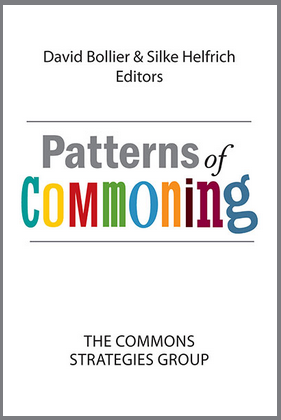“Patterns of Commoning” is Now Online!
I’m pleased to report that Patterns of Commoning is now available online. The book – a collection of more than 50 original essays about lively, productive commons – is the most accessible and far-ranging survey of contemporary commons in print.
The anthology features profiles of such innovative commons as Farm Hack, a global network that makes open source farm equipment…. the Bangla-Pesa currency that has helped revive a poor neighborhood in Kenya…. a collaborative online mapping project that help humanitarian rescue efforts….the theater commons HowlRound, the Obstea forest commons of Romania, and the water committees of Cochabamba, Bolivia.
When my co-editor Silke Helfrich and I published the book a year ago with the support of the Heinrich Böll Foundation, we deliberately bypassed commercial publishers because they demand too much control and deliver too little in return. We self-published the book with the help of dozens of commoners who pre-ordered the book, and then printed and distribute it via Off the Commons Books in Amherst, Massachusetts.
Since we have retained control over the copyright and publication, we were able to use a Creative Commons license and post the book on the Web. This is what we also did for our previous anthology, The Wealth of the Commons, whose website continues to get a lot of readers worldwide.
So head on over to the website for Patterns of Commoning, and check out the many fantastic chapters, each on its own webpage. Don’t be shy about buying a printed copy of the book via Off the Common Books or, if you must, Amazon.com. Because of our commons-based publishing scheme, we are able to offer a handsome 405-page softcover book for only $15 plus postage.
Ebook versions are available in Kindle, Nook and ePub formats. Outside of the US, the book can be ordered from Central Books in London. The German edition of the book -- Die Welt der Commons Muster gemeinsamen Handelns, published by transcript Verlag – can be found here.
- Read more about “Patterns of Commoning” is Now Online!
- Log in or register to post comments







 A primary goal of Patterns of Commoning is to show the great scope and vitality of commons initiatives around the world. There are chapters on alternative currencies and open source farm equipment, community forests and co-learning commons, theater commons and collaborative mapping, urban commons and dozens of others. Margaret Thatcher once championed neoliberal capitalism with the harsh ultimatum, “There IS no alternative!” Patterns of Commoning shows in vivid detail that there are plenty of alternatives!
A primary goal of Patterns of Commoning is to show the great scope and vitality of commons initiatives around the world. There are chapters on alternative currencies and open source farm equipment, community forests and co-learning commons, theater commons and collaborative mapping, urban commons and dozens of others. Margaret Thatcher once championed neoliberal capitalism with the harsh ultimatum, “There IS no alternative!” Patterns of Commoning shows in vivid detail that there are plenty of alternatives!
 I am happy to report that the Italian translation of my book,
I am happy to report that the Italian translation of my book, 
Recent comments